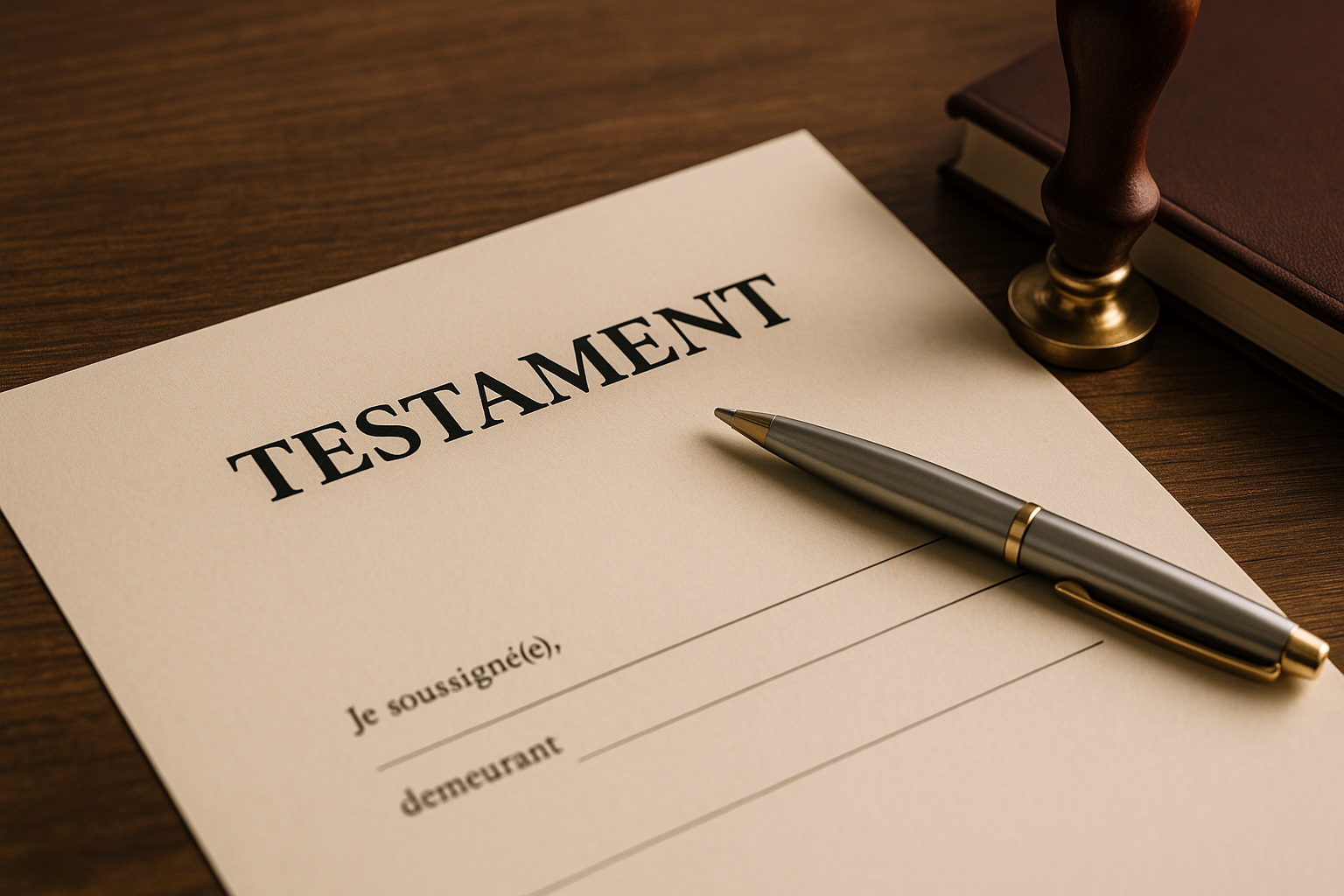Published on September 25, 2025
A will is a legal act that allows a person to express their last wishes and freely decide on the distribution of their property. In Quebec, several forms exist: notarial, holograph, or before witnesses. Each has its own formalities, advantages, and risks. Drafting a will ensures not only clarity but also the protection of loved ones and respect for your wishes.

Learn more
Drafting a will is an important step to organize the transfer of one’s property and ensure that wishes will be respected after death. In Quebec law, the will is defined as a unilateral legal act by which a person determines the devolution, upon death, of all or part of their property (ss. 703 and 704 C.C.Q.).
In the absence of a will, the rules set out in the Civil Code of Quebec apply automatically. This is known as legal devolution: it is no longer the will of the deceased that determines the distribution of property, but the law.
Who can make a will?
To be valid, a will must be written by a person who has the capacity to make a will (s. 707 C.C.Q.). Moreover, this capacity is assessed at the time of drafting. A will is always a personal act: it cannot be made jointly by two people, even spouses (s. 704 para. 2 C.C.Q.).
The Civil Code also provides for certain particularities :
- A minor may make a will, but only for property of little value (s. 708 C.C.Q.).
- Adults under tutorship or protection may also make a will, which may then be confirmed by the court (s. 709 C.C.Q.).
The formalities of the various types of wills must be respected, otherwise the will may be declared null (s. 713 C.C.Q.).
1. Notarial will
The notarial will is drawn up before a notary and received in minute form, meaning it is officially kept by the notarial office (s. 716 C.C.Q.). It offers several guarantees :
- It is prepared by a legal professional, impartial and independent; the notary who receives a will cannot be a spouse, relative, or in-law of the testator, either in a direct line or in a collateral line up to the third degree inclusive (s. 723 C.C.Q.).
- It is read to the testator, with or without witnesses, and signed by all present (s. 717 C.C.Q.).
- It is difficult to contest, since it respects strict formalities.
- It is safely preserved, avoiding loss or accidental destruction.
The Civil Code also provides specific provisions for deaf, mute, or blind persons wishing to make a notarial will.
2. Holograph will
The holograph will is the simplest form. It must be entirely handwritten by the testator and signed by them, without any technical means (s. 726 C.C.Q.). It requires no witnesses or specific formalities. However, it is more vulnerable to contestation and may be lost or destroyed.
3. Will before witnesses
The will before witnesses may be written by the testator or by a third party, but it must be signed in the presence of two adult witnesses. The testator must declare before them that it is indeed their will (ss. 727 et seq. C.C.Q.). The content of the will does not, however, have to be disclosed to the witnesses.
As with the notarial will, the Civil Code provides for special rules for testators who are deaf, mute, or unable to write or read.
Revocation of the will
A will is never final : the testator always retains the freedom to revoke it. Revocation may be :
- Express: by a new will that clearly cancels the previous one (s. 765 C.C.Q.).
- Tacit: when a new will contains provisions incompatible with the old ones (s. 768 C.C.Q.).
- By destruction: in the case of a holograph will or will before witnesses, if the testator destroys it voluntarily or requests its destruction (s. 767 C.C.Q.).
Why make a will?
Although not mandatory, a will remains a valuable tool for anyone wishing to organize the transfer of their estate. It not only helps prevent conflicts between heirs and reduce delays in settling an estate, but also ensures that your wishes are respected and that your property is transferred according to your choices.
Thus, whether notarial, holograph, or before witnesses, the will is a legal instrument of security and clarity for your loved ones. However, every situation is unique and deserves a personalized analysis. For any questions about succession law or for advice on drafting a will, do not hesitate to contact our firm. Our team will support you in protecting your wishes and securing the transfer of your property.